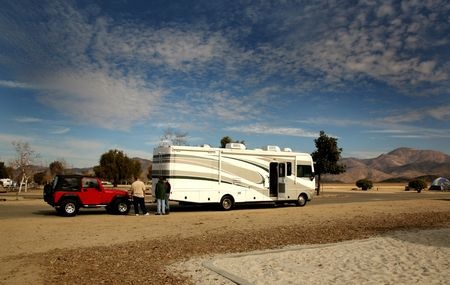Safe Towing Tips for RVs and Boats
February 9, 2015 | Category: Boating Accidents | ShareAccording to the Recreational Vehicle Industry Association, travel trailer sales have been at some of the highest levels in decades. The association anticipates in 2015, that 360,400 travel trailers will be sold, an increase of over 4 percent from those sold in 2014. This increased interest in travel trailers appears to be the result of the general improving financial conditions, lower gas prices, smaller and lighter designs of trailers, and the increased towing capacity of many newer vehicles. In most cases, the new trailers have much more room inside than the larger models of just a few years ago. Baby boomers are often buying travel trailers instead of second homes as they like the flexibility of being able to have accommodations wherever they visit.
In addition to the increased sales of travel trailers, the Recreational Vehicle Industry Association said that recreational boat sales in 2015 are expected to be substantially up. The association anticipates an increased interest in pontoon boats, aluminum fishing boats and ski and wakeboard sales. In 2014, the sale of recreational boats was up 7 percent over 2013. Recreational boating becomes more appealing to baby boomers when they have the flexibility of being able to tow their watercraft to different locations, which means the sale of boat trailers will also increase proportionately.
 "With these increased sales of travel and boat trailers, many new trailer owners will be on the road. This makes it important to understand how to safely pull a trailer on the road. We, at Spivey Law Firm, Personal Injury Attorneys, P.A., feel it is important to bring this subject up again. Last year, we posted Tips To Prevent Trailer Accidents. We encourage drivers of vehicles with trailers to review the information here and in the previous blog," said Fort Myers Vehicle Accident Attorney, Randall Spivey.
"With these increased sales of travel and boat trailers, many new trailer owners will be on the road. This makes it important to understand how to safely pull a trailer on the road. We, at Spivey Law Firm, Personal Injury Attorneys, P.A., feel it is important to bring this subject up again. Last year, we posted Tips To Prevent Trailer Accidents. We encourage drivers of vehicles with trailers to review the information here and in the previous blog," said Fort Myers Vehicle Accident Attorney, Randall Spivey.
Some of the basics - A vehicle pulling a trailer and the trailer form a hinged vehicle which is known as an articulated vehicle. This is a vehicle which is then similar to a tractor-trailer or what is called an 18-wheeler. Consideration needs to be given to balancing the weight between the tow vehicle and the trailer.
In 8 Things to Know For Safe RV Towing (03/13/12), Rand McNally lists the following:
- There are two different types of towables. Type 1 includes travel trailers, pop-up campers and hybrids. These are towed by vehicles. Type 2 includes the vehicles which are towed behind motor homes, such as boats, cars and trucks.
- Weight matters. Match your tow vehicle to a trailer. (See more information in Tips to Prevent Trailer Accidents.)
- Hitch systems vary. No one hitch will work for all situations. They come in classes ranging from I up to IV. Make sure you have the right hitch for the application.
- Hitch systems have many parts. These parts may include safety chains, break-away safety devices, load leveling and sway-control devices.
- Using checklists and doing maintenance is key. With so many parts, it would be easy to miss a part or skip a step when doing maintenance. Checklists are important.
- It is important to "Load for the Road." Weight distribution both side-to-side and lengthwise, along with securing the load will make the towing experience a safe experience.
- You will have to learn to drive again. There are RV driving schools which drivers may take before actually heading out for that vacation. Driving a vehicle with a trailer is not the same as driving a vehicle without a trailer. Driving lessons are recommended. If you do not plan to take some driving lessons, practice in empty parking lots.
- Brush up on towing laws. Knowing the local laws of the state(s) or municipality(ies) through which you will be driving is important. They will vary as to such things as the towing speed, propane tanks, operator's license class, parking, and required equipment. Rand McNally recommends the National Highway Traffic Safety Administration for information and further tips.
Using a Trailer to Tow a Boat? Safeboatingcard.com has helpful information on boat towing. You may access this information by clicking on: Boat Towing
Fort Myers Boating Accident Attorney, Randall L. Spivey is a Board Certified Trial Attorney – the highest recognition for competence bestowed by the Florida Bar and a distinction earned by just one (1%) percent of Florida attorneys. He has handled over 2,000 personal injury and wrongful death cases throughout Florida. For a free and confidential consultation to discuss your legal rights, contact the Spivey Law Firm, Personal Injury Attorneys, P.A., in Lee County at 239.337.7483 or toll free at 1.888.477.4839,or by email to Randall@SpiveyLaw.com. Visit SpiveyLaw.com for more information. You can contact Spivey Law Firm, Personal Injury Attorneys, P.A.in Charlotte County at 941.764.7748 and in Collier County 239.793.7748.

